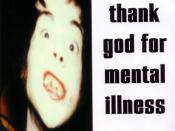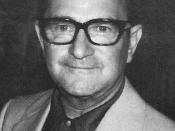Myth or Reality
Developing Professional Practice in Dual Diagnosis
Level 2
The aim of this piece of work is to appraise Khantzian's (1985) hypothesis relating to the relationship between substance misuse and mental illness. It is well reported that psychoactive substances generally have a negative effect on the central nervous system, changing mood and behaviour (Rassool, 2002b), often to an extent that behaviour is uncontrollable by the individual. However knowing this many individuals choose to use substances whether for recreational reasons or for other reasons which will be explored within this piece of work.
We know that substance abuse among those with a mental illness is a common occurrence and it is said to be one of the biggest challenges faced by mental health services (Department of Health, 2003).
The impact of substance misuse on mental health and vice versa creates many complications. It is associated with the increased risk of suicide, violence (Peterson, 2002), relapse (Kavanagh et al, 2002) and readmission (Rassool, 2002a).
Mental health services know all to well the implications that arise as a result of dual diagnosis and deal with such on a regular basis. However there are individuals diagnosed with a mental illness that will state that they use substances to 'self medicate' and there are several theorists that would support this rationale.
One of the theorists is Khantzian (1985). His theory of self-medication believes that individuals with a mental illness use substances to relieve the symptoms of the illness or to counteract the unwanted side effects of antipsychotic medications, but in reality and from experience we know that substance abuse generally leads to a deterioration of the condition with symptoms exacerbated and poorer long-term prognosis (Negrete, 2003).
When we examine Khantzian's hypothesis in the light of current research and available evidence, are we...


